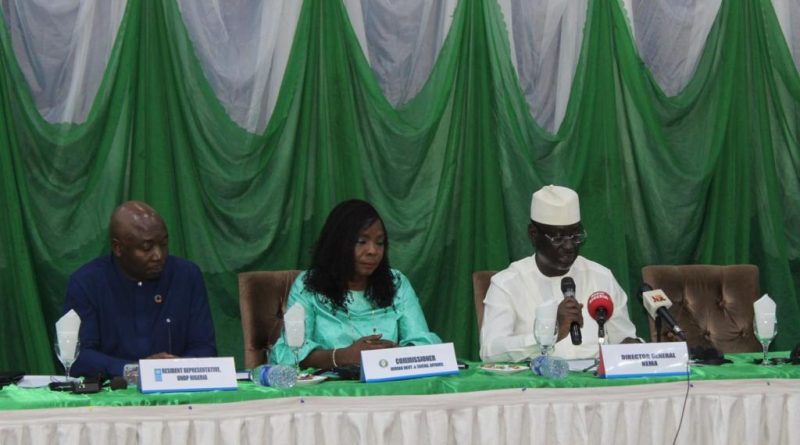West Africa Is Facing Hard Times, Finding It Difficult To Cope With Effects Of Population Growth- ECOWAS
By Bukar BOLORI
The Economic Community of West African States (ECOWAS) has lamented that member states are currently facing hard times as they are finding it difficult to cope with population growth and subsequent demand for housing, transportation, basic services, food, jobs, and urban livelihood.
Speaking at the Stakeholders’ Consultation Workshop on ECOWAS Regional Resilience Strategy for West Africa in Abuja on Tuesday, the ECOWAS Commissioner on Human Rights and Social Affairs, Prof. Fatou Sow Sarr said: “The current realities of rapid population growth in West Africa with women and children being worst victims contribute to increased demand for housing, transportation, basic services, food, jobs, and urban livelihood opportunities among others. These issues further strain the coping capacity of the region as Member States struggle to recover from these challenges.”
He said the workshop, holding in Abuja for three days, marks a significant milestone in our collective efforts to strengthen regional stability, peace, and development in West Africa, noting that the overall objective of the workshop is to bring together key technical stakeholders to deliberate on the development of a comprehensive Regional Resilience Strategy that will enhance our collective capacity to address the complex challenges facing our region.
He added that: “This forum which is to enhance promoting transparent communication and collaboration, will certainly foster resilience and sustainable development across our region.”
He decried that: “West Africa, with an estimated population of 446,452,019 equivalent to 5.47% of the total world population is faced with a magnitude of vulnerability and exposure to hazards and losses from disasters expected to increase over the next decade. The impact of climate change which is expected to result in more extreme weather situations such as heavy rains leading to devastating floods and drought in West Africa remain some of the most severe disasters in West Africa.Further to the natural disasters, our region is currently facing some of the world’s most complex challenges including conflict and violence, terrorism, extreme poverty, weak governance, high food insecurity leading to malnutrition.
“Also, the region suffers from forced human displacement of different kinds, outbreaks of epidemics including cholera, Ebola virus disease and COVID-19. Vulnerability is due to the high level of poverty and high dependence on climate change sensitive sectors such as agriculture, fisheries, mining, and forestry leading to substantial economic losses, damage to agricultural lands, infrastructures as well as human casualties.”
He said despite the development of some policies and strategies to address the issues, the region continues to witness increasing disasters which have grossly affected key sectors of the economy thereby directly affecting population and livelihoods.
He said some of the strategies emplaced to build Good Governance; Peace and Security; Macroeconomic resilience; Equitable access to basic services; (Sustainable livelihood; Gender Sensitivity and Social Inclusion; and Climate Change and Disaster Risk Reduction.
On her part, the Resident Representative of United Nations Development Programme (UNDP) Nigeria, Ms. Elsie Attafuah, said West African region is undergoing significant demographic, social, economic, environmental, and political transformations, noting that the population of the region is expected to exceed 900 million by 2050, with over 64% under 25 years old.
She insisted that: “These demographic changes have a bearing on the effectiveness of our current policies, resource allocation decisions, and development trajectory, demanding innovative approaches to address the needs of our youthful population.Despite abundant natural resources, their sustainable exploitation and equitable distribution of the benefits to communities remain a challenge. While West Africa contributes to only 1.8% of global greenhouse gas emissions, the region faces rising temperatures and extreme weather events, the impacts of which are exacerbated by inadequate development and governance, peace, and security related challenges.
Attafuah, who was represented by Deputy Resident Representative Nigeria, Mr. Blessed Chirimuta, said: “We are confident in the resilience and unwavering determination of the people of West Africa to overcome these challenges to build a better future for all, through collaborative efforts and innovative solutions.”
The Director General of the National Emergency Management Agency (NEMA), Mustapha Ahmed said the workshop whose outcome is expected to provide the foundation for resilient building is very timely considering the prevailing regional and global crises, insisting that “the workshop comes at a time, economic downturn has impacted the entire world with adverse socio-economic outcomes. Countries of the West African subregion are amongst the worst hit; hence there is no better time than now to develop a resilience strategy that will help them cope with the externalities and foster sustainable devclopment.
”Distinguished Ladies and Gentlemen, you may recall that the geography, demographic and political dynamics of West Africa have predisposed the sub region to complex nature and human induced disaster and emergency situations, ECOWAS countries have experienced scries of disasters, crises and conflict that have posed threats to normal life, the means of livelihood of the people and sustainable economic growth and development.”
He noted that the predominant disaster risk profile of West Africa has significantly posed a threat to region’s efforts in meeting crucial global and continental initiatives including the Sustainable Development Goals (SDGs) 2030; the Sendai Framework for Disaster Risk Reduction (SFDRR) 2015-2030; and the African Agenda 2060, with the other initiatives impacted include the African Union Program of Action (AUC-PoA) and the African Continental Free Trade Agreement (AfCFTA) treaty.




